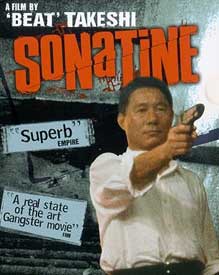Sonatine is largely a by-the-numbers yakuza film about a gangster boss (played by actor-director Takeshi "Beat" Kitano) who is weary of the criminal world & would like to retire. But he is sent to Okinawa with some of his men on one last mission that is a doublecross from the beginning, which will not serve well the lives of his men, & will leave him with nothing to live for but violent revenge.
Kitano's standard routine of standing stoic, emotionless, & poker-faced as he guns people down always has its demented appeal. For what it is, the film's pretty good because Takeshi Kitano is in it. But he has done films so much better, & Sonatine can almost be viewed as a warm-up trial for more successful films like Kitano's Hanabi.
This film's one ingredient that would not be expected in any number of similar or even better films is a long pastoral centerpiece. Midway in the story, our antihero & his men go to a hide-out by the sea & in their boredom play a series of charming games together, revealing their childlike natures.
They dress up like dancing girls to emulate an Okinawa dance they had seen. They pretend to be toy sumo wrestlers wrestling in the manner of toys. They dig & disguise sandpits along the beach attempting to trick each other into falling into the pits. And more such innocent mischief.
There's additionally a tepid love story through this long pastoral patch of the film, important enough to make the viewer hope for a happy ending for at least someone. Because this part of the film stretches on for a long while, it will bore the bejabbers out of anyone who just wanted to see a yakuza action film. But if the quiet part of the film can be appreciated, it will provide the only moments of originality in a story otherwise awfully commonplace for its genre.
Overlooking its merely cliche "action" elements, one is left with a gangland portrait more senstive than romantic, more tragic than heroic, of men who might have been decent in their lives but instead succumb to their own violence & criminality as though it were Fate & not their own foolish choices that led them to these lives, & these deaths.
I think what Kitano wished to achieve with this film has a certain nobleness to it, to de-mystify & rehumanize these standard gangster characters. But in sum they are still thin characters. For a film vastly superior to this one in capturing a sense of humanity & gangsterism, see the elegant tragedy of friendships & mayhem, Kamikaze Taxi.
copyright © by Paghat the Ratgirl
|
